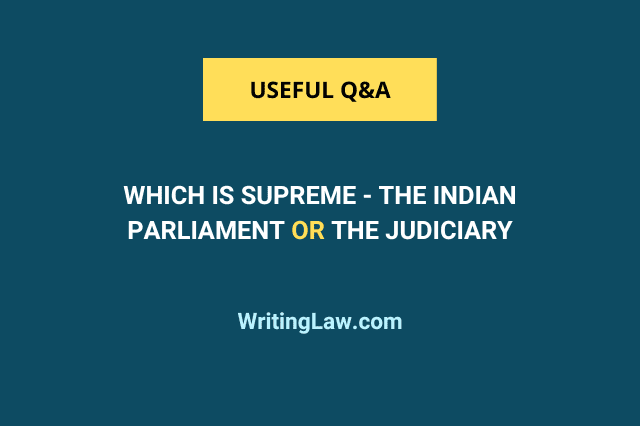
We, the people of India, have resolved to govern ourselves in a way that promotes human rights and democratic accountability under a federal policy. In the end, power belongs to the people in any constitutional democracy, and it is exercised through the rule of law, which reflects their collective desire.
Constitutional institutions are the only instruments that wield limited power in a system where power is divided and operated through checks and balances.
Parliament is the body that makes legislation. Does this imply that Parliament can enact whatever it wants? Which power is responsible for protecting the Constitution if Parliament goes against it? It is the judicial branch that has the power to protect the Constitution.
The Constitution is a creature of the State and binds all three wings (the Executive, the Legislative, and the Judiciary). Constitutional institutions must complement one another as state coordinating organs, and no single institution can claim primacy (priority, greater importance) over the other. Therefore, it is critical for the nation’s progress that all three wings of government work in perfect harmony.
According to the Constitution, the Judiciary has the power of judicial review. Courts must assess the law’s validity and determine its scope with the powers granted by the Constitution while adjudicating.
When there is a legislative vacuum in the realm of human rights, the Judiciary steps in, and its actions only serve to deepen democracy and the ordinary man’s faith in the rule of law.
Within the limits of the Constitution’s provisions, Parliament has the power to alter it. The Supreme Court ruled in 1951 that Parliament had unrestricted jurisdiction to change the Constitution, including the Fundamental Rights. However, it stated in 1967 that Fundamental Rights cannot be repealed even if the Constitution is amended. Later, in 1967, it was decided that the Constitution had certain fundamental qualities or essential characteristics that cannot be changed or eliminated by amendments. They are:
- Fundamental rights
- Federal character of the Constitution
- Secular character of the Constitution
- Democratic character of the polity
- National unity and integrity
- Constitutional supremacy
Must Read: 18 Most Important Amendments of the Indian Constitution
Conclusion
The Parliament has limited powers and does not go against the Constitution’s essential structure. The Judiciary has no jurisdiction to meddle and no need for judicial review if Parliament passes legislation that respects the norms of the Constitution’s basic framework. As a result, it is apparent that the Indian Constitution is supreme in India.
Read Next:
1. What Is Judicial Activism – With Case Laws, Pros and Cons
2. The Withering State of Indian Parliamentary Democracy
3. What Are Pressure Groups and Their Role in Indian Polity
4. Pros and Cons of Regional Benches of the Supreme Court of India
- What Is the Burden of Proof Under the PMLA? - 18th April 2024
- Ranjit D Udeshi vs State of Maharashtra – Case Explained - 11th April 2024
- What Is Proceeds of Crime Under PMLA (With Case Laws) - 7th April 2024







